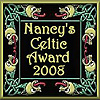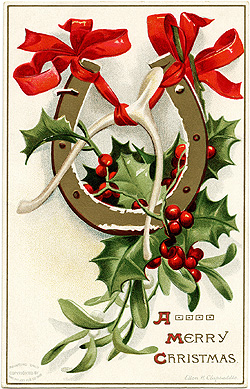| |

Traditions, folklore, history and more. If it's Irish, it's here. Or will be!
"People will not look forward to posterity who never look backward to their ancestors."
-Edmund Burke




Quotes
Library: Books, Movies, Music
Prints & Photos
Poetry
Jokes


Shops Ireland
Bunús na Gaeilge
(Basic Irish)
Circle of Prayer
Blessings
Did You Know?
Himself/Herself
Write to Us
Readers Write..
Links/Link to Us
Advertise with us
Awards & Testimonials
Submissions Guide


|
|
|
Irish Superstitions for the Christmas Season
by Bridget Haggerty

This article was inspired by a reader who asked us if we knew about an Irish superstition that said it was lucky to receive a Christmas card which pictured the Three Wise Men. Our research led us to a veritable cornucopia of beliefs...
...but we never did find one related to the Magi. We're still looking - and if you're familiar with this superstition, please tell us about it. In the meantime, here are many beliefs which have not been included in our other Christmas articles - at least, if memory serves, they haven't!
In the old days, children were usually charged with the responsibility of gathering the Yule-tide decorations and finding a holly bush loaded with berries was considered very lucky. Holly is a symbol commonly associated with Christmas and has been used in Yule-tide celebrations for almost two thousand years.
To the Druids, it was holly's evergreen nature that made it special. They believed that it remained green to help keep the earth beautiful when the other trees shed their leaves. It was also their custom to wear it in their hair when they ventured into the forests to watch the priests collecting mistletoe. Holly was also once used for protection, and in ancient times, people would decorate doors and windows with it, in hopes that it would capture, or at least dissuade, any evil spirits before they could enter the house.
While Mistletoe isn't very prevalent in Ireland, it can be found, and it was held in very high regard by our ancestors. In the Celtic language, Mistletoe means "All Heal." It was believed to have all sorts of miraculous qualities including the power of healing diseases, banning evil spirits, bringing good luck and bestowing great blessings. In fact, even enemies who happened to meet beneath a Mistletoe in the forest would lay down their arms, exchange a friendly greeting, and keep a truce until the following day. From this old custom grew the practice of suspending Mistletoe over a doorway or in a room as a token of good will and peace to all.
There are many superstitions associated with Christmas Eve. It was once believed that on Christmas Eve, an angel stands on every spike of the holly leaves. It was also said that the Good People would come in out of the cold to find shelter in the holly branches and that the mischief of the evil spirits was suspended for this Holy Night. One lovely belief is that honey bees celebrate the Nativity by waking up from their winter sleep and humming a song of praise to Christ. Unfortunately, only those who have led a blameless life could hope to hear their song, which is said to be the 100th psalm:
"Sing joyfully to the Lord, all you lands;
serve the Lord with gladness;
come before him with joyful song.
Know that the Lord is God..."
In the old days, people believed that animals celebrated the arrival of Christ and that the cows in the cattle-sheds and the deer in the forests went down on their knees at midnight. Others believed that animals were able to speak like humans on Christmas Eve - but it was bad luck to try and listen in!
The placing of a lighted candle in the window of a house on Christmas Eve is still practised today. Primarily it was, and still is, a symbol of welcome to Mary and Joseph as they travelled looking for shelter. The candle should be lit by the youngest member of the household and only be extinguished by a girl bearing the name 'Mary'. To have no light meant that you shared the guilt of the Innkeeper at Bethlehem who said, "No Room"!
After evening meal, the kitchen table was again set and on it were placed a loaf of bread filled with caraway seeds and raisins, a pitcher of milk and a large lit candle. The door to the house was left unlatched so that Mary and Joseph, or any wandering traveller, could come in. It's also said that leaving a loaf of bread on the table will ensure bread for the coming year. And, you should also leave a bowl of water out to be blessed by the travellers - this water would be used for cures.
It was believed that the rooster would crow at unusual times, and to hear him crow at midnight was a good omen, as was a new moon. A clear star-filled sky would bring good crops in the summer, and shoes placed side by side would prevent a quarrel. For good health throughout the following year, you should eat an apple at the stroke of midnight.
There were also sinister superstitions associated with the eve of Christ's birth. If, when all were seated round the fire, one shadow on the wall behind them was headless, then the person who cast the shadow would be dead before the end of the year. Someone would also die if a hoop fell off a cask. This actually has a logical explanation - when a cask is full, the hoops are tight; when it is empty, they become loose. If the principal candle goes out for some reason during the Christmas season, it is a bad omen - possibly the death of the head of the household.
It was commonly held in Ireland that the gates of Heaven open at midnight and those who die would go straight in. It was also believed that no prayer would go unanswered on this most holy of nights.
As for Christmas Day itself, according to an old verse,
"If Christmas Day on a Sunday fall
A troublesome Winter we shall have all."
As might be expected, there are a number of superstitions associated with food:
It's said to be lucky to eat breakfast by candlelight on Christmas morning. You should eat plum pudding on Christmas to avoid losing a friend before next Christmas.
Refuse a mince pie at Christmas dinner and you will have bad luck for the coming day.
Drink three sips of salted water before Christmas dinner for good health - But on the second day after Christmas, abstain from meat to prevent fever.
Snow on Christmas means Easter will be green. A blowing wind on Christmas Day brings good luck - but, wearing new shoes will bring bad luck. And never turn a mattress - very bad luck for the turner! The child born on Christmas Day will have a special fortune and good luck will come to the home where a fire is kept burning throughout the Christmas season. To bring luck and blessings, you should take a wisp of straw from the nativity scene at the church and bring it home.
The weather on each of the twelve days of Christmas signifies what the weather will be on the appropriate month of the coming year. And, all decorations are traditionally taken down on Little Christmas or Twelfth Night - the feast of the Epiphany on January 6th. It is considered to be bad luck to take them down before then. Also, you shouldn't fix a leak in the roof during the twelve days - the leak will come back if you do!
In north Leinster, east Connaught and south Ulster, a special ritual was observed on Twelfth Night. A round cake was placed on the table and a rush candle or bog oak representing each member of the family was lit. The lights were said to go out in the order that the members of a family would die. On a lighter note, in west Meath, it was customary to set up a sieve of oats around which was placed a dozen candles and in the center, a larger candle. This was done in memory of Jesus and his apostles - "lights of the world."
There are many, many other superstitions related to Christmas in Ireland which we haven't mentioned here because they're interspersed throughout our "Christmas in Ireland" series and we didn't want to repeat them. But you won't find this one: On Epiphany, the tail of a herring should be rubbed across the eyes of a child to give immunity against disease for the remainder of the year!
Note: In reference to the superstition about the Three Kings, Lynn McFadden Davis writes:
"I found your website while searching for the origins of this
superstition. In our family the first Christmas card received with the Magi on it is hung over the front door, for the whole year to bring good luck to the house. My sister and I were discussing how many different friends we have infected with this superstition and I decided to see if anyone else in the world does this! Our family is of Irish descent, but I have no idea where this superstition came from. Not even which side of our family."
Echoing Lynn, Patricia McKenna Donahue wrote to us:
This evening I was on the internet trying to determine the origin of the Christmas Card over the front door and came across your website. Every year my father, on New Year's Day, would go through the Christmas cards we received and choose one card which illustrated the Three Wise Men and that card would hang over our front door for the next year. As a child I remember asking why he did it and he replied it was to bring health and harmony to our family during the new year. During one year, our living room was totally renovated - walls brought down, doors replaced, window trim removed and replaced but through the whole renovation, the card remained above the front door. My father passed in 1981 but I have kept the tradition alive with my own family. Since religious cards are not as popular as they once were, I have to admit that on occasion some cards have done duty for more than one year. I have tried to introduce my friends to this tradition and fortunately have several good friends who go out of their way to send me my "Three Wise Men" cards each year so we have continual health and harmony in our home.
It is clear that the tradition exists and is apparently Irish. We hope someone can provide a more substantive (and older) origin.
Resources:
Content:
The Year in Ireland by Kevin Danaher
Superstitions of The Irish Country People by Padraic O'Farrell
Encyclopedia of Superstitions edited and revised by Christina Hole
Image Credit: The Old Design Shop
|
|
Fri, Sep 27, 2024
 The Galway Hooker The Galway Hooker
This unique vessel, with its distinctive curved lines and bright red sails, originated in the village of Claddagh. During the 19th century, hookers supported a significant fishing industry and also carried goods, livestock and fuel. Seán Rainey is remembered for building the last of the original boats, the Truelight, for Martin Oliver who was to become the last king of the Claddagh; as king, he was entitled to white sails on his boat. Since the mid seventies, many of the old sailing craft which were on the verge of extinction have been lovingly restored and new ones have been built. During the summer months they can be seen at festivals such a Cruinniú na mBád - the Gathering of the Boats - in Kinvara.
Click for More Culture Corner.
Containing more that two thousand supersitions of Britain ranging over the past six hundred years, and extending down to the present day,this book demonstrates that superstitions are world-wide and inherent in all peoples of the world in exactly identical forms of fear and avoidance.
Click here for Encyclopedia.
|
More than 100 years ago, Lady Wilde, mother of famed author Oscar Wilde, put together this fascinating collection of archaic cures, ancient spells, homespun proverbs, visionary omens and enlightening prophecies.
Click here for Irish Cures, Mystic Charms & Superstitions
Whether you are Irish by blood, or just wish you were, A Treasury of Irish Folklore is the book for you. Everything from Irish myths, superstitions, and even songs of Ireland are included. From blessings, to spells, this book is chocked full of info... Amazon Reviewer
We have this and it is everything you may want
Click for Irish Folklore.
|
|
|
|
|




 The Galway Hooker
The Galway Hooker